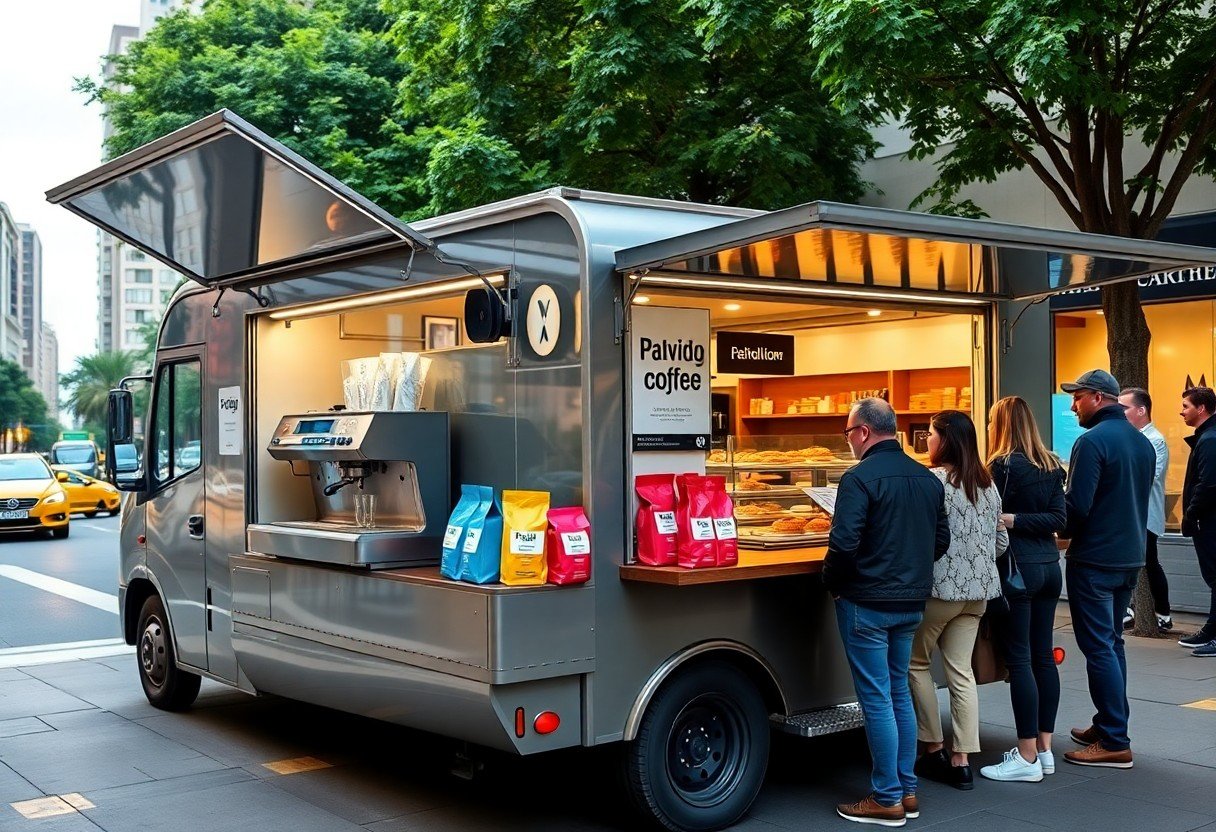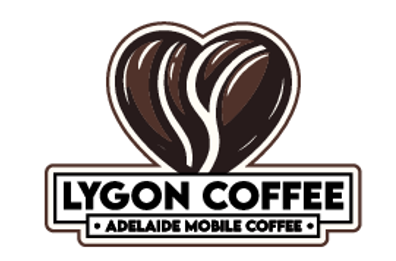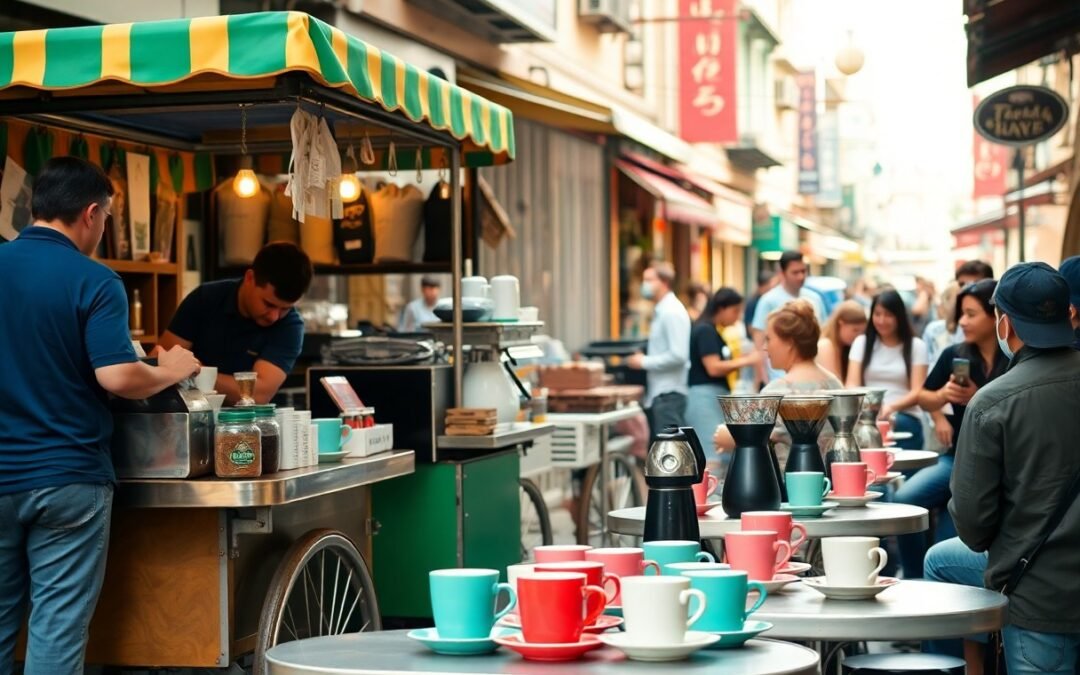Coffee lovers are experiencing a transformative shift as mobile coffee services gain popularity. With the convenience of having high-quality brews delivered right to your location, you can enjoy artisanal coffee without the need to visit a café. These mobile vendors not only cater to your taste preferences but also provide a unique experience, often showcasing local roasters and innovative brews. Understanding this trend allows you to appreciate how mobile coffee is reshaping your coffee culture and enhancing your daily routine.
The Evolution of Coffee Culture
Your coffee experience has transformed significantly over the years, evolving from communal brewing rituals to a global obsession with artisanal craftsmanship and complex flavors. Enjoying coffee is now not just a daily routine but a cultural statement, reflecting broader social trends and preferences. As you explore this evolution, you’ll find that each phase of coffee culture has contributed to a deeper appreciation of the beverage, leading to innovative brewing methods, diverse tastes, and the rise of specialty coffee shops.
From Cafés to Curbside: A Historical Perspective
Your journey into coffee culture reveals how cafés once served as social hubs, fostering conversation and creativity. Over time, the convenience of mobile coffee service began to infiltrate urban landscapes, making high-quality coffee accessible to busy lifestyles. This shift signifies a departure from leisurely café visits toward a fast-paced coffee culture, aligning with the modern consumer’s need for efficiency without sacrificing quality.
The Impact of Convenience on Consumer Behavior
Convenience has fundamentally reshaped how you engage with coffee. Mobile coffee services cater to the on-the-go consumer, allowing you to grab your favorite brew without the delays of traditional cafés. Survey data indicates that 64% of coffee drinkers actively seek convenience, with many prioritizing quick service over ambiance. This trend shows that while quality remains imperative, the demand for speed and accessibility is leading the charge in coffee culture.
The rise of mobile coffee can be linked to your fast-paced lifestyle. As time becomes a premium commodity, you prioritize coffee options that fit seamlessly into your day. The ability to order ahead, pay digitally, and quickly retrieve your drink speaks volumes about shifting consumer priorities. Businesses respond by developing apps and curbside pickup that cater to this demand, highlighting that convenience drives consumer loyalty and satisfaction, reshaping the landscape of coffee consumption as you know it.
The Mechanics of Mobile Coffee Business Models
Mobile coffee businesses operate through various innovative models that cater to changing consumer preferences. Understanding these models will help you identify which aligns best with your entrepreneurial vision. From food trucks serving specialty brews to coffee carts strategically placed in high foot-traffic areas, each model offers unique advantages and challenges. Assessing your market, location, and target audience can guide your decisions and enhance sustainability.
Types of Mobile Coffee Ventures: Trucks, Carts, and Pop-ups
Different mobile coffee ventures serve distinct purposes and customer experiences. Trucks provide a full café experience, while carts offer quick service. Pop-ups are ideal for seasonal or special events, capitalizing on temporary demand.
- Food Trucks: Full-service options with a wide menu
- Carts: Quick, on-the-go coffee solutions
- Pop-ups: Temporary, event-based coffee sales
- Push Carts: Smaller, less formal setups
- Online Orders: Pre-orders for convenient pick-up
Thou must carefully consider location, target audience, and service style to ensure success.
| Type | Description |
|---|---|
| Food Truck | Mobile cafés on wheels with diverse offerings. |
| Coffee Cart | Small, portable setups focusing on efficiency. |
| Pop-Up | Temporary venues leveraging events for exposure. |
| Push Cart | Compact options for quick service in busy areas. |
| Online Orders | Pre-orders allowing for expedited service. |
Navigating Regulations and Licenses: What Every Entrepreneur Needs to Know
Underestimating the importance of regulations and licenses can stall your mobile coffee venture. Each area has specific health codes, permits, and zoning laws that you must adhere to. Researching local requirements early ensures compliance and avoids legal pitfalls. Additionally, securing food safety certifications can enhance your brand’s credibility with customers.
Obtaining the necessary permits and licenses varies significantly by location. You must navigate health department regulations, licensing for food service, and potentially even local business taxes. Research thoroughly to determine what is required in your area. Engaging with local entrepreneurial resources can provide valuable insights into compliance. Additionally, establishing connections with other mobile coffee operators can offer tips on overcoming bureaucratic hurdles effectively.
Crafting the Perfect Brew on Wheels
Perfecting your brew on the move demands a blend of skill and the right equipment. Mobile coffee operations thrive on efficiency without compromising quality, allowing you to serve exceptional drinks that keep customers coming back. Prioritizing taste and presentation becomes key, ensuring every cup reflects your brand’s commitment to excellence, even in a mobile setting.
Equipment Essentials for Mobile Coffee Success
Your equipment directly impacts the quality of coffee you deliver. A high-performance espresso machine, grinder, and reliable water filtration system are non-negotiables, while portable accessories like a milk frother, drip brewers, and brewing ceramics enhance versatility. Investing in durable, compact equipment not only streamlines your workflow but also elevates the customer experience.
Sourcing Quality Ingredients: The Importance of Sustainability
Choosing sustainable ingredients shapes your mobile coffee brand and contributes positively to the environment. Sourcing fair trade, organic coffee beans not only ensures quality but also supports ethical farming practices. By prioritizing local suppliers, you minimize your carbon footprint and promote community engagement, reinforcing your brand’s values in every cup served.
Highlighting sustainable sourcing can differentiate your brand in a competitive market. For example, local roasters may offer unique blends that resonate with your clientele, while ensuring ethical labor practices. This connection fosters a loyal customer base that values quality and sustainability. Certifications like Fair Trade or Rainforest Alliance not only appeal to eco-conscious consumers but also elevate your brand’s credibility. Engaging in storytelling about your ingredients can amplify this impact, creating a deeper connection with your customers who are increasingly informed and passionate about their coffee choices.

The Rise of Specialty Coffee in Transit
Specialty coffee has evolved beyond cafes, grabbing the attention of commuters and travelers. With a growing emphasis on quality and unique sourcing, mobile coffee vendors now serve blends and single origins that rival traditional coffee shops. Each cup reflects an artisanal approach, inviting you to discover complex flavors while on the go. As consumers lean towards premium options, mobile vendors have adapted, ensuring that every sip is not just caffeine but an experience in itself, transforming your daily routine into a coffee journey.
Exploring the Palate: Trends in Flavor and Presentation
Today’s mobile coffee offerings showcase an array of innovative flavors and stunning presentations that elevate your drinking experience. From vibrant cold brews infused with fruits and spices to visually stunning lattes adorned with intricate latte art, every element is crafted to tantalize your senses. Vendors are also embracing sustainability by using eco-friendly materials for both brewing and serving, ensuring that taste and presentation align with contemporary values.
Engaging Coffee Enthusiasts Through Education and Experience
Mobile coffee vendors are not just serving drinks; they are creating a community of informed coffee lovers. Many offer interactive experiences, such as brewing workshops and tasting events, where you can learn the intricacies of coffee preparation and flavor profiles. Coupled with accessible information about sourcing and roasting, these efforts foster a deeper appreciation for coffee, empowering you to explore beyond your usual preferences.
These educational experiences often involve hands-on participation, allowing you to engage directly with the coffee-making process. Workshops may cover everything from basic brewing techniques to advanced flavor pairing, providing insights into the cultivation of specialty beans and their unique characteristics. Such interactions reinforce a connection between you and your coffee, nurturing a culture where every sip tells a story and each cup is a celebration of craftsmanship. Mobile vendors are setting a new standard by combining convenience with enrichment, inviting you to join a vibrant coffee community through education and shared experience.
The Future of Coffee on the Move
The mobile coffee trend shows no signs of slowing down, as consumers increasingly demand convenience without sacrificing quality. You may find trucks, carts, and pop-up shops expanding their offerings, blending unique brews and food pairings that cater to local palates. As this market continues to grow, expect more innovative collaborations between mobile vendors and local producers, enhancing the overall coffee experience for on-the-go enthusiasts.
Technological Innovations Shaping Mobile Coffee
Technologies like app-based ordering, contactless payments, and smart brewing equipment are revolutionizing the mobile coffee landscape. You might find vendors using cutting-edge brewing methods such as nitro-infused coffee or cold brew on tap, enhancing flavors and improving efficiency. Innovations in mobile espresso machines also allow baristas to serve high-quality drinks in limited spaces, ensuring that your cup of coffee is consistently excellent no matter where you are.
The Role of Social Media in Building a Coffee Community
Social media platforms play a critical role in connecting coffee lovers and vendors, creating a vibrant community around mobile coffee. You can follow your favorite coffee trucks on Instagram or Facebook, enabling you to stay updated on their locations and special offerings. Engaging with other enthusiasts through hashtags and posts fosters a sense of belonging and encourages local support for these small businesses.
Social media not only showcases the creativity of mobile coffee vendors but also facilitates real-time interactions among coffee lovers. Platforms like Instagram allow you to discover new brewing techniques, share personal coffee experiences, and participate in challenges that promote local coffee culture. Vendors often rely on customer feedback shared online to refine their offerings and build loyal followings, making your engagement meaningful. Through these interactions, you’ll find a community that shares your passion for quality coffee and supports the artisans bringing it to life.
To wrap up
To wrap up, the rise of mobile coffee services means greater convenience and variety for you as a coffee lover. With the ability to access high-quality brews on the go, your coffee experience can be customized to fit your lifestyle. This growing trend not only enhances your daily caffeine fix but also allows you to support local businesses and innovative coffee artisans. As mobile coffee culture continues to expand, you can look forward to even more exciting options and flavors at your fingertips.
FAQ
Q: What is the rise of mobile coffee?
A: The rise of mobile coffee refers to the increasing popularity and availability of coffee being served from food trucks, pop-up stands, and mobile carts, allowing coffee lovers to enjoy quality coffee on the go.
Q: How does mobile coffee benefit coffee lovers?
A: Mobile coffee offers convenience by providing access to high-quality coffee in various locations, often at events or busy urban areas, making it easier for coffee lovers to enjoy their favorite beverages without needing to visit a traditional café.
Q: Are mobile coffee services meeting the quality standards of traditional coffee shops?
A: Many mobile coffee services focus on quality and sustainable sourcing, often employing skilled baristas and using premium beans, allowing them to compete effectively with established coffee shops.
Q: How can consumers find mobile coffee vendors in their area?
A: Consumers can locate mobile coffee vendors through social media platforms, local food and beverage apps, or by checking community event listings, which often promote the presence of mobile coffee at festivals and markets.
Q: What trends are shaping the future of mobile coffee?
A: Trends include a focus on specialty coffee, innovative brewing methods, eco-friendly practices, and partnerships with local producers, ensuring that mobile coffee remains appealing to an evolving audience of coffee enthusiasts.

